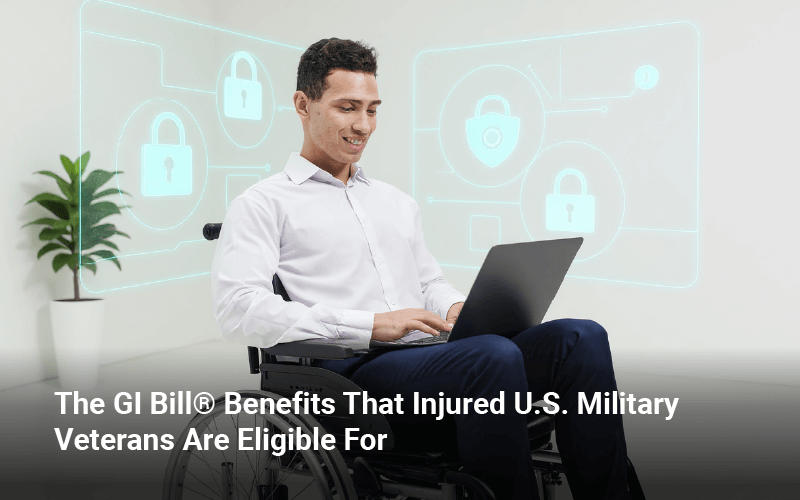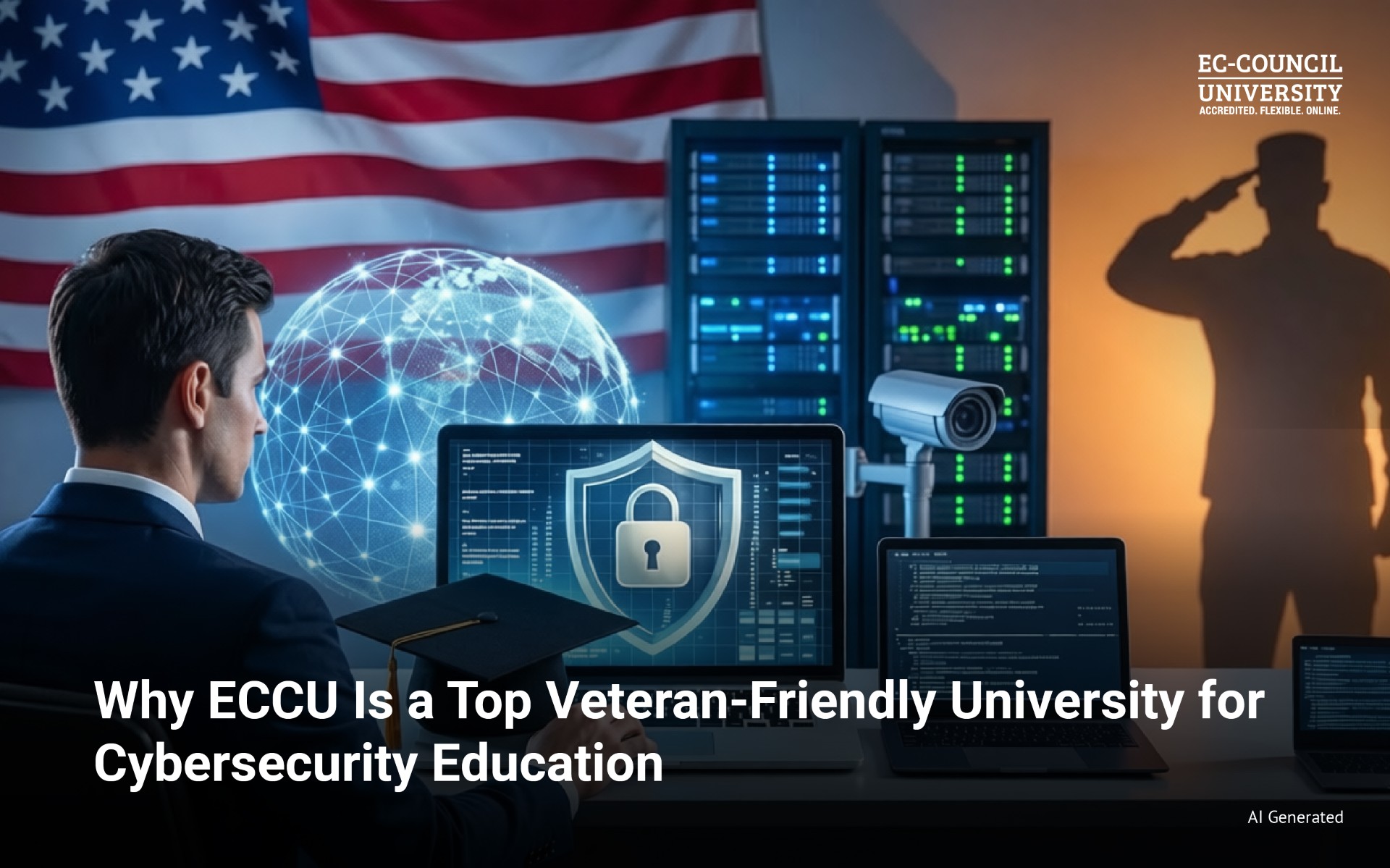Introduction
Transitioning from military service to life as a private citizen is never easy. It’s also deeply personal. That’s particularly true for service members who leave the military with injuries, visible or invisible. The good news is that the U.S. Department of Veterans Affairs (VA) and related programs offer a host of educational and support benefits designed to help injured veterans adapt and step into meaningful civilian careers. Below is a practical, in-depth guide that explains which GI Bill® and VA benefits may apply depending on the type of injury sustained, as well as an examination of how injured veterans can use their benefits as a foundation to develop successful careers, especially in cybersecurity.
How Benefits are Determined
Eligibility for education benefits such as the Post-9/11 GI Bill® depends on factors like length of service, discharge status, and whether an injury is service-connected. Separate VA programs like Veteran Readiness and Employment (VR&E), Special Monthly Compensation (SMC), and housing and automobile grants are available to address disability-related needs that the GI Bill® does not directly cover. For Purple Heart recipients and those discharged for a service-connected disability, special rules often expand or accelerate eligibility.
Service-Connected Disabilities (Education and Career Support)
If you were honorably discharged due to a disability that the VA finds to be ‘service-connected’, you may qualify for both Post-9/11 GI Bill® education benefits and for VR&E (Chapter 31) services that go beyond tuition
Post-9/11 GI Bill®:
This includes the cost of tuition, a housing allowance, and book/supplies stipends. The amount depends on your service length and eligibility percentage. Notably, veterans discharged with a service-connected disability after at least 30 continuous days of service may be eligible.
Veteran Readiness and Employment (VR&E):
VR&E offers individualized career counseling, tuition and training, job placement support, and accommodations or tools needed to train or work. VR&E can be particularly valuable when a service-connected disability requires career rehabilitation or job accommodation.
How they work together:
Many injured veterans use the Post-9/11 GI Bill® to pursue degrees while VR&E helps with equipment, adaptive tech, vocational counseling, or a tailored employment plan.
Here’s an example: A service member honorably discharged for a service-connected back injury may use the Post-9/11 GI Bill® to earn an online degree in cybersecurity, while VR&E pays for an ergonomic workstation, certification exam fees, or job-search coaching.
Purple Heart Recipients
If you received a Purple Heart on or after September 11, 2001, VA rules provide the following educational benefits:
- You are eligible for 100% of Post-9/11 GI Bill® benefits regardless of time served.
- You may receive priority access to VA healthcare and counseling.
This means Purple Heart recipients often do not need the usual time-in-service thresholds that apply to other veterans.
Mental Health Injuries (PTSD, MST)
Invisible wounds such as PTSD (Post-Traumatic Stress Disorder) or effects of Military Sexual Trauma (MST) are treated with both clinical services and vocational support:
- VR&E can design education and employment plans that accommodate mental-health needs, such as modified schedules, remote training, and stepwise re-entry to work.
- VA mental health care provides counseling, therapy, and medication management that many veterans use while studying. If honorably discharged, veterans with these conditions remain eligible for GI Bill® education benefits.
Therefore, veterans with PTSD or MST who worry about classroom environments can choose online degree programs and use VR&E to request supportive services.
Serious Physical Injuries
Veterans with severe physical injuries like amputations, spinal cord injuries, or severe traumatic brain injuries often qualify for an array of benefits:
Post-9/11 GI Bill®:
Eligible veterans can receive full education benefits (tuition, housing, etc.) if they meet the program’s service/discharge criteria.
Specially Adapted Housing (SHA) Grants and Automobile / Adaptive Equipment Grants:
These grants help veterans modify homes for accessibility or obtain specially adapted vehicles. They do not fall under the GI Bill® benefits but are VA disability benefits that can be crucial for independence.
VR&E Independent Living:
When a veteran is unable to work or pursue a degree because of the severity of their injuries, VR&E’s independent-living benefits provide services aimed at maximizing independence and quality of life, rather than returning to traditional employment.
Non-Service-Connected Injuries
If an injury is not service-connected (for example, a civilian accident after discharge), GI Bill® education benefits may still be available based on your qualifying service, but VA disability compensation, SMC, VR&E, and housing/auto grants typically require a service connection. Please consult with the VA for specific information on a case-by-case basis.
Special Monthly Compensation (SMC)
SMC is an additional tax-free benefit paid on top of VA disability compensation for certain severe disabilities like loss of limbs, need for regular aid and attendance, and certain anatomical losses. It helps offset the higher costs of care and living with severe disability. If you qualify, SMC can be a meaningful supplement while you pursue further education.
Why Cybersecurity is an Excellent Career Path for Injured Veterans
Cybersecurity is mission-oriented, often remote-friendly, rapidly growing, and values the discipline and security-clearance readiness many veterans possess. Industry analysis finds that veterans are an important pipeline for professional cybersecurity roles. This makes cybersecurity a practical, high-impact choice for veterans rebuilding careers after injury.
Success Story: A Veteran Who Built a Rewarding Career in Cybersecurity
Charles “Chuck” Danley was a military veteran who transitioned into cybersecurity leadership after completing EC-Council University’s Master of Science in Cyber Security program, earning his master’s degree, and gaining valuable cybersecurity certifications along the way. His pathway illustrates how combining GI Bill® support with career-focused degrees and certifications can accelerate professional growth as a cybersecurity expert.
Read about his story here: Charles Danley’s Cybersecurity Career Transformation
Pursue a Cybersecurity Career with Help From EC-Council University
If you’re an injured veteran exploring your next career move, cybersecurity offers purpose, strong demand, and roles that fit a variety of physical and scheduling needs. EC-Council University (ECCU) is veteran-friendly, accepts GI Bill® benefits for approved programs, and offers fully online bachelor’s, master’s, and graduate certificate programs designed to help you harness your military skills as the launchpad to a meaningful cybersecurity career.
For personalized education and career advice for veterans, please reach out to ECCU’s Student Advisory Team by clicking the link below:







